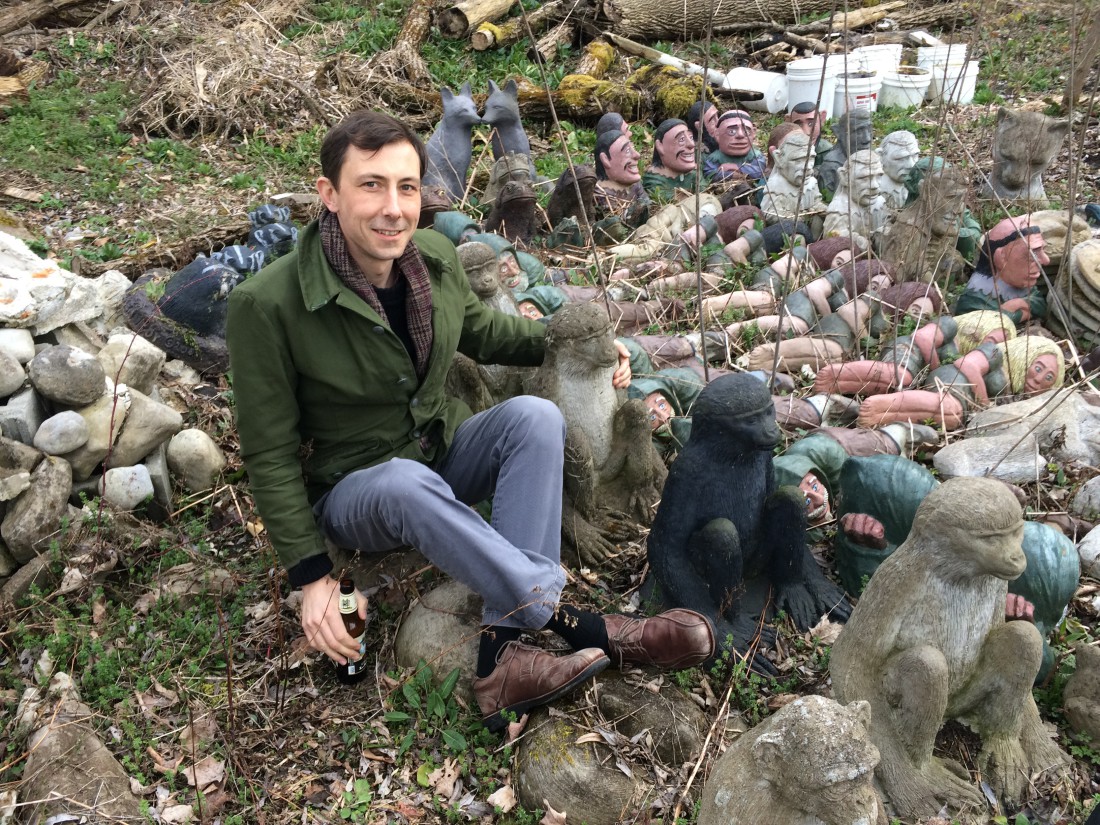Writing is a passion, though finding an audience for literary work can prove challenging. Publishing deals are hard to come by, and there’s not always a supportive fan base at the ready. “The value of poetry, which is such a communal enterprise — even through it’s written in singularity — is having a place to put it,” says writer, musician and former Xpress staffer Jaye Bartell.
So, in the mid-2000s, he created the Fresh Air Reading Series (named for a poem by Kenneth Koch), which invited a number of local poets to share work at the Black Mountain College Museum + Arts Center (as well as other Asheville locations, now mostly defunct). That institution will move to its new home at 120 College St. in September; Bartell will present Later: Readings from then and now, as the final BMCM+AC program at its 56 Broadway space.
That Thursday, Aug. 2, event (which evolved from an invitation from museum program director Alice Sebrell) will include a retrospective on Bartell’s writing and involvement with the Asheville literary circle, circa 2003-08. He’ll produce a limited-print chapbook — by typewriter — of that retrospective.
First, Bartell has to unravel the timeline of the Fresh Air Reading Series. “I did it kind of unaware of the history that preceded it,” he says. But it was the influence by the competition slam and performance poetry era of Asheville in the late ’90s and the Beat writers — who were loosely connected to the Black Mountain College legacy — that inspired Bartell to launch his own event.
“Maybe I did, altogether, seven or eight of the Fresh Air series, but each one had four people,” he recalls. That resulted in “the multiplicity of circles, and the way they come together, even so briefly. The ‘poetry scene’ I was part of then was really just the confluence of a bunch of different people who became aware of one another based on the occasion of an event.”
In 2013, Bartell relocated to New York City. (Even though he’s moved on from Asheville, Bartell remains connected to the city. His art and music collaborators such as Nathanael Roney and J. Seeger still live here, and Bartell plans to return in the fall to record his next album). He currently lives and works in Brooklyn and, since signing to the Sinderlyn record label, has released three albums and toured both the U.S. and Italy. Though music had been a thread throughout Bartell’s creative career — a friend taught him to play guitar at 20 and he considered it a hobby — “When I moved [to Brooklyn] I didn’t bring any instruments,” he says. He’d recorded his album Loyalty before leaving Asheville “and I thought I would just be a writer,” he says.
Ironically, Bartell says, he hasn’t performed spoken word for the past five years (not counting his participation in the annual New Year’s Day Poetry Marathon as part of the The Poetry Project at St. Mark’s Church, which includes the likes of Patti Smith, Eileen Miles and other literary luminaries). “It’s a process that will probably continue — giving up music for the sake of writing,” he says. “It’s not that one can’t exist without the other … in a lot of the descriptive material about my music, the poetry element is always mentioned.”
He continues, “I never thought of poetry as an inflection of spirit [or] a mood. It was always a pragmatic form of work.”
It’s also, to a degree, a means of recording time and place — especially in terms of how it creates a movement or era or scene. Bartell has found, that in retracing his Asheville history with BMCM + AC, he’s also unearthing a piece of the city’s story. Akumi, a sushi restaurant on Wall Street (now Cucina 24) was “where it all started,” he recalls. Then Bartell’s readings moved to New French Bar (on Biltmore Avenue, now White Duck Taco), with intermittent events, unrelated to the Fresh Air Reading Series, at BoBo Gallery on Lexington Avenue (now Calypso).
“It’s funny to remember these places and think of the displacement, or the superimposition that happens with time,” says Bartell. “People are eating lunch at these places now and not really knowing that we used to sit there and chain-smoke and read from our notebooks.”
But even if that story can’t be recaptured, it can be remembered. And perhaps, in that reminiscence (and the tangible product of a chapbook recollecting the era), other writers will be inspired to grasp and bolster whatever scene-of-the-moment is ripe for cultivating at the coffee shops and bars and bookstores they frequent.
“There were so many people working in writing [and other] artists around that time that I thought, ‘Why re-enact these mythic, historical entities when we could really kind of make our own situation here?’” Bartell says. “And that ended up developing to the museum as a parallel location to other readings I was doing at other places in town.”
WHO: Jaye Bartell presents Later: Readings from then and now
WHERE: Black Mountain College Museum + Arts Center, 56 Broadway, blackmountaincollege.org
WHEN: Thursday, Aug. 2, 7 p.m. $5 students and BMCM+AC members/$10 nonmembers




Before you comment
The comments section is here to provide a platform for civil dialogue on the issues we face together as a local community. Xpress is committed to offering this platform for all voices, but when the tone of the discussion gets nasty or strays off topic, we believe many people choose not to participate. Xpress editors are determined to moderate comments to ensure a constructive interchange is maintained. All comments judged not to be in keeping with the spirit of civil discourse will be removed and repeat violators will be banned. See here for our terms of service. Thank you for being part of this effort to promote respectful discussion.